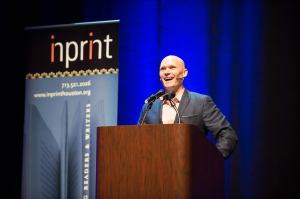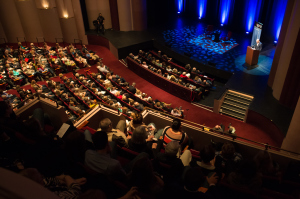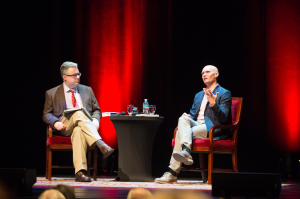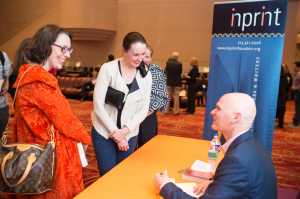Saying ‘yes” to the world: Anthony Doerr reads for H-town
January 29, 2016, by Doni Wilson
 It felt electric when I walked down to my seat on Monday night for the highly anticipated, sold-out Inprint reading by Anthony Doerr. Winner of the 2015 Pulitzer Prize for All the Light We Cannot See, Doerr’s novel about war-ravaged France has been on the New York Times bestseller list for the better part of two years.
It felt electric when I walked down to my seat on Monday night for the highly anticipated, sold-out Inprint reading by Anthony Doerr. Winner of the 2015 Pulitzer Prize for All the Light We Cannot See, Doerr’s novel about war-ravaged France has been on the New York Times bestseller list for the better part of two years.
There was so much interest in his visit to H-town that, for the first time, Inprint, in collaboration with Houston Public Media, live-streamed the reading. In fact, tickets for Doerr’s event, part of the 2015-2016 Inprint Margarett Root Brown Reading Series, sold out in 90 minutes. According to St. John Flynn, Arts and Culture Director at Houston Public Media, more than a thousand people saw the reading online, and that number will rise, as it will soon be available on the Inprint website for those who still wish to partake.
Impressive.
As Rich Levy introduced Doerr, he surprised me by saying Doerr would be reading from a short story—his 2011 Sunday Times EFG Private Bank Short Story Award Winner. Doerr, who grew up in Cleveland, Ohio, has described himself as coming from a place where if you described yourself as a “writer,” you would be called “precocious or pretentious.” Doerr, who is likeable and easy-going, certainly is not pretentious. But he sure can write.
 Levy tells us that Doerr, a voracious reader, was “allowed to read while he ate,” and suddenly, this sounds like an excellent idea. Some of his favorite writers: Virginia Woolf, Herman Melville, Anne Carson, Cormac McCarthy, J.M. Coetzee. He also likes Calvin and Hobbes.
Levy tells us that Doerr, a voracious reader, was “allowed to read while he ate,” and suddenly, this sounds like an excellent idea. Some of his favorite writers: Virginia Woolf, Herman Melville, Anne Carson, Cormac McCarthy, J.M. Coetzee. He also likes Calvin and Hobbes.
Doerr has not only written his award winning All the Light We Cannot See, but also the novel About Grace, two short story collections, The Shell Collector and Memory Wall, and a memoir, Four Seasons in Rome. In addition, he wrote a long-running science column for The Boston Globe.
When Doerr reaches the stage, he is gracious, praising Houston’s weather (he lives in Idaho), saying this winter day feels like “95 degrees” to him. He talks about the collaboration between Inprint, University of Houston (where he gave a talk earlier that day), and Brazos Bookstore (which has just been nominated as one of the nation’s best independent bookstores) as rare—“seems like paradise.”
In introducing his award-winning short story, “The Deep,” Doerr talked about what was in his head while writing it: things like “whale falls” (the carcass of a whale on the ocean bottom), marine biology, what it might be like having a child with a disability, economic recessions and depressions, salt mines. It is fascinating to hear how he connects all of these seemingly disparate things. He explains: “Lots of things get crammed into the stew of your mind.”
He is funny—very funny—describing the absurdity of how some kids act as if “there’s no mystery left in the world,” in contrast to Doerr’s enthusiasm for what he observes in the natural world. Who else would describe a whale fall as “a great Burger King dropping out of the sky,” serving as a “feast” and an entire eco-system in and of itself? Suddenly, I am interested in the “striations of time” suggested by a salt mine—I have caught a severe case of Doerr’s palpable and contagious enthusiasm for—well, everything. I am excited about his story just hearing him talk about it.
In spite of his excited demeanor, Doerr is still a master of the understated phrase on the page, and it stays with you. Early in the story, the protagonist’s life begins to unfold: “His father is off stage, unaccounted for.” So subtle, you almost miss it. Almost.
Doerr’s phrasing reminds me of a poet. Some of the lines you have to write down—you don’t want to forget them: “His heart will have to do three times the work.” “Sixteen, thinks Tom, eighteen if I’m lucky.” “By the time he’s ten he’s in remedial everything.” Doerr is a wonderful reader, speaks in an upbeat and cheerful voice even when wistful, even when something in the story is “a daily lesson in insidiousness.” Mid-reading, Doerr asks the audience, “You guys doing ok out there?” You don’t see that every day. You wish you had written a line like this one: “To say no to Ruby Hornaday would be to say no to the world.” His hero Tom (how often do you use that word anymore?) writes to Ruby, “I am as lonely as the Arctic Sea.” And then you realize what Doerr is all about: even when things can’t get sadder, can’t get worse, everything is still worthy of our attention, our susceptibility to marvel: “Everything is radiant.” Doerr is no moralist, but reminds us of the wonder around us, a tough feat in cynical times: the world will never run “out of life.” No matter how you felt before you walked into that reading, you feel better when you leave, and you believe him.
 After the reading, novelist and UH Honors College faculty member Robert Cremins interviews Doerr, asking him about his “wide-ranging and fearless imagination.” Doerr is modest, claims he is “stealing from research” for some of his inspiration, including old colorized postcards. Doerr touches on his love of reading, how he got hooked on C.S. Lewis’s The Chronicles of Narnia when younger, how “librarians are drug dealers”—getting us hooked on books.
After the reading, novelist and UH Honors College faculty member Robert Cremins interviews Doerr, asking him about his “wide-ranging and fearless imagination.” Doerr is modest, claims he is “stealing from research” for some of his inspiration, including old colorized postcards. Doerr touches on his love of reading, how he got hooked on C.S. Lewis’s The Chronicles of Narnia when younger, how “librarians are drug dealers”—getting us hooked on books.
Doerr says he feels most balanced when immersed in what he calls “three streams”—life, reading, and writing. He discusses the miraculous of the everyday—the amazing “technical miracles” that we have come to take for granted, such as the transmission of sound and light through technology. He talks about how radio, the phenomenon of “hearing the voice of a stranger in your ear, was a miracle,” and he makes you realize it still is.
The purpose of writing and art? Doerr says that both remind us “that you are not alone. Let me show you how another person has lived.” He tries to steer his students away from the desire to dramatize “universals”—specificity is best. “That’s how you transport people—through the particulars. Art puts you in the life of someone else.”
Cremins asks Doerr about “the wonder and the study of the natural world,” and Doerr notes his admiration for another writer who incorporates nature and science in her fiction, Ship Fever author Andrea Barrett. Doerr’s mother was a science teacher, and he tells the audience that he was never forced to choose between science and the arts—instead, he was just “pursuing curiosity.” Doerr adds, “the more you learn about anything, the more interesting it becomes.”
 He talks about German state schools during the war, bombed medieval cities, French journalists who blow smoke into his face in tiny French restaurants while asking him about symbolism. He is funny without malice, adventurous without pretention—sharing his experiences without making you feel like you have missed out. Instead, you just want to look at the world as he does. Cremins is right when he tells Doerr that so many of his books are about “how to say ‘yes’ to the world.” It is a good thing to know how to do.
He talks about German state schools during the war, bombed medieval cities, French journalists who blow smoke into his face in tiny French restaurants while asking him about symbolism. He is funny without malice, adventurous without pretention—sharing his experiences without making you feel like you have missed out. Instead, you just want to look at the world as he does. Cremins is right when he tells Doerr that so many of his books are about “how to say ‘yes’ to the world.” It is a good thing to know how to do.
Doerr in conversation, and on the page, easily navigates through a lot of territory: how we understand light, “how limited our senses are.” The way that “cynical work” is “not that interesting” to him. How editing can be “literary liposuction” (phrase courtesy of Lawrence Wright) or removing “passenger words that are just along for the ride.” How writing itself can be a mystery: “I really like the surprise of not knowing what a character will do.”
The evening seemed to go by fast—Doerr is engaging, and his students are lucky. One of my favorite moments happened at the end of the night, when an audience member asked him about his work, and the way it was “free of irony, sarcasm, a certain world weariness”—a perfect articulation of what much of contemporary literature is not. Was it, she wondered, “risky” to write like this, given the current “literary landscape?”
Doerr’s answer: “You can’t let fear stop you from doing the things you are interested in doing.” Good advice for writing. And life.
The Inprint Book Club will discuss Anthony Doerr’s All the Light We Cannot See on February 14, 2016, 4 pm at Inprint House. Click here for details.

